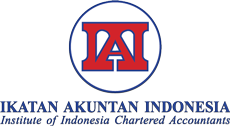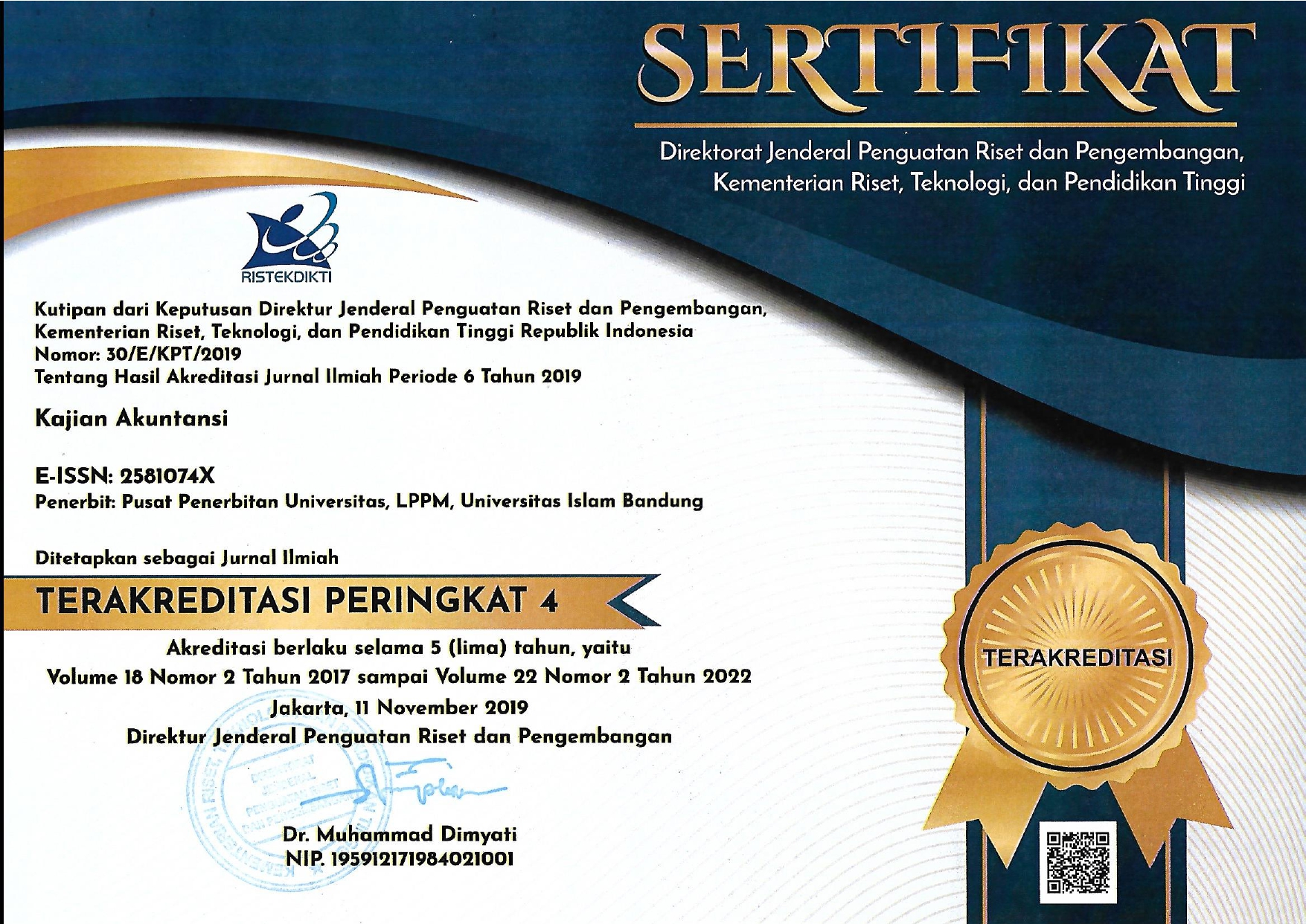Accounting Ethics Education: What and How To Teach?
Abstract
For academics, accounting ethics education is a challenging field, not only because of the common perception that it is considered secondary to accounting technical courses, but also due to inconclusive results of its effectiveness on ethical behavior as well as uncertainty of what and how to teach. However, the recurring occurrence of accounting scandals as well support from accounting professional bodies on the importance of ethics in accounting curriculum, has contributed to the increasing attention given to accounting ethics. This paper tries to contribute to the growing accounting ethics literatures by reviewing the contents and learning methods. Eleven topic categories are suggested, along with fifteen learning methods which are inventoried from a number of literatures. Academics should try to discover interesting and unconventional methods to teaching ethics, to equip the traditional methods of teaching. It should be noted however, that the effectiveness of accounting ethics education does not rely only on having proper teaching materials and methods, but also on the institutional support and the learners’ commitment. Finally, three areas are identified to improve accounting ethics education, i.e. to develop a more principles-based approach, to shift the focus of ethics education to prevent ethical failures, as well as to take on a greater role of business ethics in general, including accounting ethics, to the society as a whole. Knowing the what and how aspects is expected to be a start in improving and fostering accounting ethics education.
Keywords: accounting ethics education; teaching materials; teaching methods
Keywords
Full Text:
PDFReferences
AACSB. (2016a). A Collective Vision for Business Education
AACSB. (2016b). Eligibility Procedures and Accreditation Standards for Accounting Accreditation
AACSB. (2017). Eligibility Procedures and Accreditation Standards for Business Accreditation
AACSB Ethics Education Task Force. (2004). Ethics Education in Business Schools
Abdolmohammadi, M.J. & Reinstein, A. (2012). Practising accountants’ views of the content of accounting ethics courses and course effects on attitudes and behavior. Advances in Accounting Education: Teaching and Curriculum Innovations, 13, 213-236
Barker, C.R. (2014). An examination of the ethical discourse of the US public accounting profession from a Foucaultian perspective. Journal of Accounting & Organizational Change, 10, 2, 216-228
Blanthorne, C. (2017). Designing a theme-based ethics course in accounting. Advances in Accounting Education: Teaching and Curriculum Innovations, 20, 135-140
Boose, M.A. & Dean, F.P. (2011). A proposition for effective integration of ethics across the business curriculum. International Business & Economics Research Journal, 1, 3, 1-8
Burns, D.J., Tackett, J.A., Wolf, F. (2015). The effectiveness of instruction in accounting ethics education: Another look. Research on Professional Responsibility and Ethics in Accounting, 19, 149-180
Chawla, S.K., Khan, Z.U., Jackson, R.E., Gray III, A.W. (2015). Evaluating ethics education for accounting students. Management Accounting Quarterly, winter 2015, 16, 2, 16-25
Christensen, L.J., Peirce, E., Hartman, L.P., Hoffman, W.M., Carrier, J. (2007). Ethics, CSR, and sustainability education in the Financial Times top 50 global business schools: Baseline data and future research directions. Journal of Business Ethics, 73, 347-368
Davis, E. (2017). Ethics Within and Throughout. AACSB Blog
Dellaportas, S. (2006). Making a difference with a discrete course on accounting ethics. Journal of Business Ethics, 65, 391-404
Dzuranin, A.C., Shortridge, R.T., Smith, P.A. (2013). Building ethical leaders: A way to integrate and assess ethics education. Journal of Business Ethics, 115, 1, 101-114
Fort, T.L. (2016.) Adding Ethics to the Classroom http://bized.aacsb.edu/articles/2016/01/adding-ethics, accessed 13 December 2017
Franks, R.A. & Spalding Jr., A.D. (2013). Business ethics as an accreditation requirement: A knowledge mapping approach. Business Education & Accreditation, 5, 1, 17-30
Ghazali, N.A.M. (2015). The influence of a business ethics course on ethical judgments of Malaysian accountants. Journal of Asia Business Studies, 9, 2, 147-161
Graham, C.M., Kelly, P., Massey, D.W., & Van Hise, J. (2014). One size does not fit all – different strategies for teaching accounting ethics. Research on Professional Responsibility and Ethics in Accounting, 17, 139-157
Hejase, H.J., Tabch, H. (2012). Ethics education: An assessment case of the American University of Science and Technology – Lebanon. International Journal of Islamic and Middle Eastern Finance and Management, 5, 2, 116-133
Heller, N.A. & Heller, V.L. (2011). Business ethics education: Are business schools teaching to the AACSB Ethics Education Task Force Recommendations? International Journal of Business and Social Science, 30-38
Holmes, K., Marriott, L., Randal, J. (2012). Ethics and experiments in accounting: A contribution to the debate on measuring ethical behavior. Pacific Accounting Review, 24, 1, 80-100
Huehn, M.P. (2016). Ethics as a catalyst for change in business education? Journal of Management Development, 35, 2, 170-189
IAESB. (2017). Handbook of International Education Pronouncements
IFAC. (2006). Approaches to the Development and Maintenance of Professional Values, Ethics and Attitudes in Accounting Education Programs
Jackling, B., Cooper, B.J., Leung, P., Dellaportas, S. (2007). Professional accounting bodies’ perceptions of ethical issues, causes of ethical failure and ethics education. Managerial Auditing Journal, 22, 9, 928-944
Jonson, E.P., McGuire, L., Cooper, C. (2016). Does teaching ethics do any good? Education + Training, 58, 4, 439-454
Kelly, P.T. (2017). Integrating leadership topics into an accounting ethics course – preparing students for a challenging profession. Advances in Accounting Education: Teaching and Curriculum Innovations, 20, 141-180
Klein, G. (2016). Ethics in Accounting: A Decision Making Approach. Wiley
Klimek, J. & Wenell, K. (2011). Ethics in accounting: An indispensable course? Academy of Educational Leadership Journal, 15, 4, 107-118
Koumbiadis, N. & Pandit, G.M. (2014). Has the AICPA changed the accounting profession for better or worse? The case of educational change. Journal of Accounting & Organizational Change, 10, 2, 190-215
Kurpis, L.V., Beqiri, M.S., Helgeson, J.G. (2008). The effects of commitment to moral self-improvement and religiosity on ethics of business students. Journal of Business Ethics, 80, 447-463
Lawter, L., Rua, T., Guo, C. (2014). The interaction between learning styles, ethics education, and ethical climate. Journal of Management Development, 33, 6, 580-593
Levy, D. & Mitschow, M. (2008). Accounting ethics education: where do we go from here? Research on Professional Responsibility and Ethics in Accounting, 13, 135-154
McDonald, G.M. (2004). A case example: Integrating ethics into the academic business curriculum. Journal of Business Ethics, 54, 371-384
Mintz, S.M. & Morris, R.E. (2014). Ethical Obligations and Decision Making in Accounting: Text and Cases, 3rd edition. McGraw Hill
O’Leary, C. (2012). Semester-specific ethical instruction for auditing students. Managerial Auditing Journal, 27, 6, 598-619
Perri, D.F., Callanan, G.A., Rotenberry, P.F., Oehlers, P.F. (2009). Education and training in ethical decision making: comparing context and orientation. Education + Training, 51, 1, 70-83
Rezaee, Z., Szendi, J., Elmore, R.E. & Zhang, R. (2015). Corporate governance and ethics education: viewpoints from accounting academicians and practitioners. Advances in Accounting Education: Teaching and Curriculum Innovations, 13, 127-158
Shapiro, J.P., Hassinger, R.E. (2007). Using case studies of ethical dilemmas for the development of moral literacy: Towards educating for social justice. Journal of Educational Administration, 45, 4, 451-470
Shaub, M.K. (2017). A wisdom-based accounting ethics course. Advances in Accounting Education: Teaching and Curriculum Innovations, 20, 181-216
Sisaye, S. (2011). The functional-institutional and consequential-conflictual sociological approaches to accounting ethics education. Managerial Auditing Journal, 26, 3, 263-294
Taylor, A. (2013). Ethics training for accountants: does it add up? Meditari Accountancy Research, 21, 2, 161-17
Utama, S. (2018). No Accounting Education is Complete without Values, Ethics, & Attitudes. IAESB Personal Perspectives Series. April 2018
West, A. (2017). The ethics of professional accountants: an Aristotelian perspective. Accounting, Auditing & Accountability Journal, 30, 2, 328-351
Weybrecht, G. (2016). How to teach students to be ethical. AACSB Blog
Williams, P.F. (2015). The focus of professional ethics: Ethical professionals or ethical profession? Research on Professional Responsibility and Ethics in Accounting, 14, 15-35
https://sustainabledevelopment.un.org/?menu=1300, accessed 25 September 2018
DOI: https://doi.org/10.29313/ka.v21i2.4109
Refbacks
- There are currently no refbacks.
Copyright (c) 2019 Kajian Akuntansi
Indexed by:
This work is licensed under a Creative Commons Attribution-NonCommercial-ShareAlike 4.0 International License.










